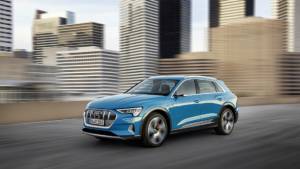India-bound Audi e-tron SUV launched globally starting at USD 74,600
Cars as we know them are about to change. 2018 is the year when autonomous driving technologies have started making their way into production cars and in the wider spectrum, premium carmakers are going mass market with electrified vehicles. Tesla's free run is about to get challenged in a big way now as the mainstream brands are entering the space. Jaguar has let out its electrified cat in the i-Pace, Mercedes-Benz has revealed the EQC and now its Audi's turn to put the e-tron into production.

It was a long time coming and over the last ten years, Audi had released a series of concepts around the term e-tron - a sportscar, a racecar, an SUV and even a Sportback. Unsurprisingly though, it's the more popular SUV body style that has been green-lighted for production. It has the honours of wearing the e-tron badge as a production model name before it turns into a commonly used suffix for electrified Audi cars - much like what happened to the 'quattro', in the Audi scheme of things.
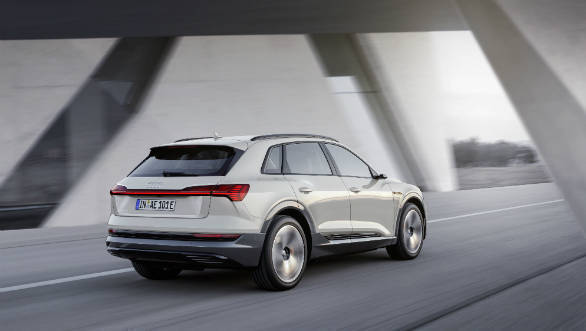
The e-tron's styling is almost unchanged over the 2015 e-tron quattro concept, though the production car is marginally larger. The designers had to play around with the height and the profile of the car to make sure that it conformed to the aerodynamics needed to maximum range while maintaining the aesthetic proportions that one would expect of a premium urban SUV. The teardrop on the headlamp is a new Audi SUV design trait, but it's detailing comprising horizontally stacked LED DRLs will be an e-tron signature. The e-tron uses conventional LEDs over OLEDs for all its lighting elements. Behind the driver-side wheel arch is a panel that slides down to reveal the charging socket of the car. The car packs a generous 600l boot, while under the bonnet is a small 60l cavity that Audi calls 'frunk', for stowing away the charging cable. The e-tron uses the same wheel and tyre sizes as the Q7, which combined with the smaller proportions of the car, give the e-tron a beefed up stance.
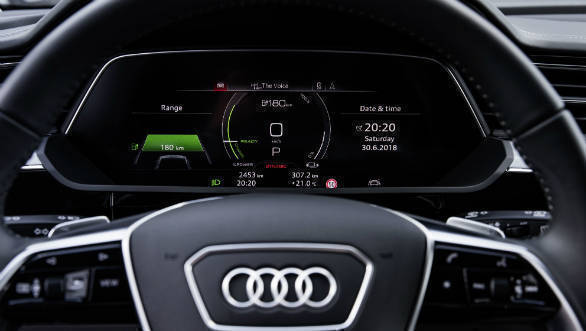
Between the wheels and in the floor is a 95kWh lithium-ion battery pack that comprises of 36 modules containing 12 pouch-type cells each. Each cell is rated at 60Ah, which is higher than the 35-56Ah cells used by Tesla and Nissan. The battery pack is capable of a 150kW DC rapid charging, which is 30kW superior to Tesla's Supercharger. The fast charging is capable of recharging up to 80% of the battery in 30 minutes and is compatible with the Ionity rapid charging network that is being setup by a consortium of manufacturers like the VW Group, Daimler, BMW, and Ford. Standard AC charging is the 11kW type, but Audi will also provide 22kW AC chargers as an option.
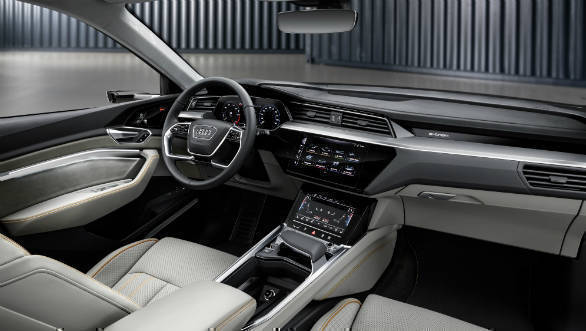
The battery pack powers an electric motor on each axle for a dual-motor powertrain configuration that has a combined output of 360PS and 664Nm. A boost mode allows a temporary bump in power up to a 408PS for eight seconds. The peak output is lower than the ~500PS hinted by the concept but is good for a 0-100kmph time of 5.7s with boost or 6.6s otherwise, and a top speed of 200kmph. The e-tron will come with the quattro electric all-wheel-drive as standard.

The e-tron weighs around three tonnes, out of which, around 700kg is the battery alone. Audi says they could have made the batteries lighter, but for the intended safety, weight distribution and dynamics they had to keep the weight up. Its placement in the floor lowers the centre of gravity and aids handling dynamics. To that effect, the e-tron gets air suspension in all four corners, but it will be interesting to see how its masks all that bulk when going into a bend.
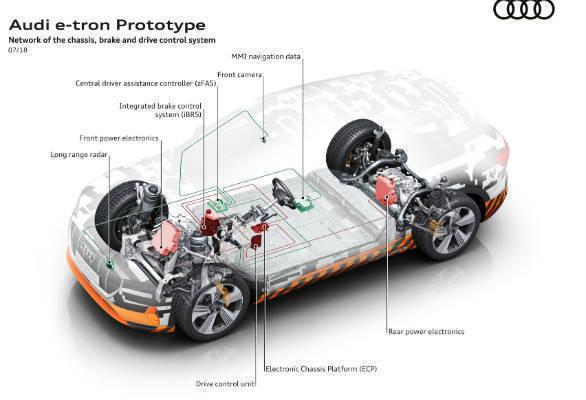
Braking is also a big concern with weight like that. Therefore the e-tron's regenerative braking uses an electro-hydraulic system. The hydraulic piston is able to provide a higher pressure, which in turn gives it quicker braking response and lower braking distance. The braking system also works in a single pedal operation that will become common to electrified vehicles, wherein the system automatically initiates deceleration forces when you lift your foot off the accelerator pedal. Audi also claims that the regenerative braking can recuperate up to 30% of the car's total driving range.
Speaking of which, thanks to advancements in energy density of the batteries, the e-tron can manage a driving range of up to 400km. Driving range and charging times are the most important criteria that will dictate the acceptance level of each electrified vehicle and therefore, aerodynamic efficiency becomes all the more important.
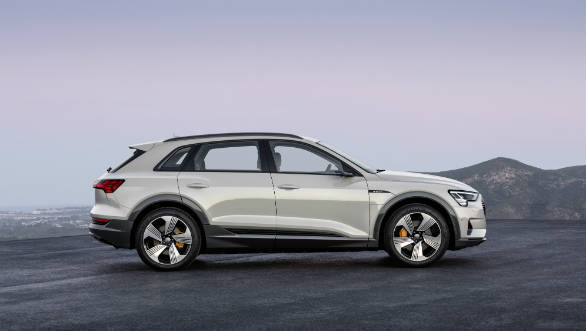
The low-roofline, self-adjusting air-suspension, and the slim profile for the wing mirrors have enabled the designers to reach a drag coefficient as low as 0.27cD on the e-tron. The mirrors are the party piece, as they feature wide-angle cameras instead and that display the feed on slick OLED screens between the door pad and the A-pillars. These mirrors alone contribute around 20kms to the overall driving range. The e-tron's grille contributes to the aero too, despite its conventional design. Behind it is a radiator that is mated to a lattice-type water-based thermal system for the batteries. The system can either heat or cool the batteries to maintain an optimum operating temperature of 25-35 degrees Celsius even in regions of extreme climates.
It would be interesting to see how the e-tron copes with the Indian conditions then. Speaking of which, Audi India confirms that the e-tron will be launched in our market by late 2019. As in the European market, they could be looking at a subscription model too for the e-tron and following electrified vehicles, but more details on that topic will be revealed next year. Prices for the e-tron start at $79,000 (approximately Rs 60 lakh without taxes) and the car will go on sale in the US and in Europe by the end of 2018. In 2019, Audi will also showcase its second fully electrified car under the e-tron banner, which will be based on the Sportback concept showcased last year. Its launch is in line with Audi's plans of having three battery electrified vehicles (BEVs) by 2021 and 20 e-tron badged models by 2025 which will feature a certain degree of electrification.
See our video review of the Audi EV SUV below:
Also see: Audi e-tron SUV first drive Video
Starts Rs 99.99 Lakhs
-NA-
Automatic
317
664
-NA-
